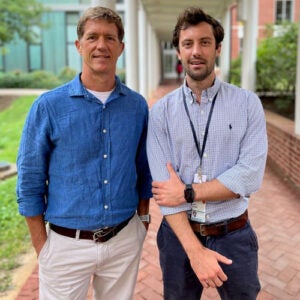
Michael Brown, PhD (left) and former PhD student Jack Cronk
Michael Brown, PhD, a professor of medicine, nephrology, and of microbiology, immunology and cancer biology and resident member of the Beirne B. Carter Center for Immunology Research, was awarded a $3 million grant from the NIH National Institute of Allergy and Infectious Diseases to study how specific natural killer (NK) cell receptors can enhance killing of virus infected cells and deliver antiviral immunity during HIV infection.
Human Immunodeficiency Virus (HIV) is a virus that attacks the immune system. In most infected persons, HIV destroys immune cells which leads to acquired immunodeficiency syndrome (AIDS). While HIV infected patients can be effectively treated with antiviral drugs, there is no cure for this disease. Rare HIV infected persons known as ‘elite controllers’ however go on with their lives without ever developing AIDS and without medical intervention. Prior studies have shown that these “elite controllers” share a distinctive genetic signature which may enhance NK killing of HIV infected immune cells, though the basis for this effect remains elusive.
Dr. Brown and two former PhD students, Jack Cronk and Awndre Gamache, uncovered a clue to better understanding how NK cells may protect against HIV. While searching for mouse genetic factors that could increase protection against viral infection, two NK cell receptors, one inhibitory and the other activating, were discovered and shown to work together in a paired fashion to enhance NK killing of virus infected cells.
In this new project, Dr. Brown’s team will study the molecular genetic basis for “paired receptor” NK cell virus control. Studies aim to identify paired signaling pathways leading to enhanced NK cell antiviral immunity using next gen sequencing technologies to comparatively analyze isolated mouse NK transcriptomes and proteomes. Complementary studies will be performed with human peripheral blood to explore whether human NK cells can mediate paired receptor-like responses towards HIV infected immune cells.
Results from these studies will help to define the molecular mechanisms driving paired receptor NK cell virus control, to delineate the impact of NK receptor polymorphism and will lay the groundwork for developing next generation antiviral therapies or vaccines to enhance immune protection against viral infection.
Key collaborators on this project include UVA School of Medicine faculty Stefan Bekiranov, PhD, Sepideh Dolatshahi, PhD, Marie-Louis Hammarskjöld, PhD, Jennie Ma, PhD, Coleen McNamara, MD, and Suna Onengut-Gumuscu, PhD.
Originally posted in Medicine in Motion News October 28, 2025 by jta6n@virginia.edu (NIH Awards $3 Million to Michael Brown, PhD, for Research on Molecular Genetic Basis for NK Cell Protection Against Viral Infection – Research – Medicine in Motion News)
